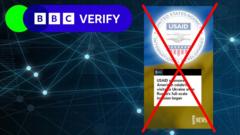In a recent surge of online misinformation, a video purporting that USAID, the primary U.S. government foreign aid agency, has remunerated Hollywood stars with millions for trips to Ukraine has gained significant traction on social media platforms. Notably, this misleading content has been shared enthusiastically by high-profile accounts, including Elon Musk, which amplifies its reach and potential influence.
However, experts have quickly flagged the video as fabricated, pointing out its characteristics typical of Russian disinformation campaigns. Reports from organizations such as BBC Verify highlight the systematic fabrication of stories that serve to sow discord and confusion regarding international events, particularly in relation to Ukraine's ongoing conflict.
Olga Robinson, a journalist from BBC Verify, elaborates on the markers of disinformation present in the viral clip, stating, "This video represents a worrying trend in how misinformation can exploit real narratives and mislead large audiences." The story underscores the importance of scrutinizing the sources and authenticity of media, especially when disseminated by influential figures.
As misinformation continues to spread, the need for critical media literacy becomes more pressing. The public is urged to verify claims before sharing, thereby curbing the impact of disinformation on public perception and policy.
















